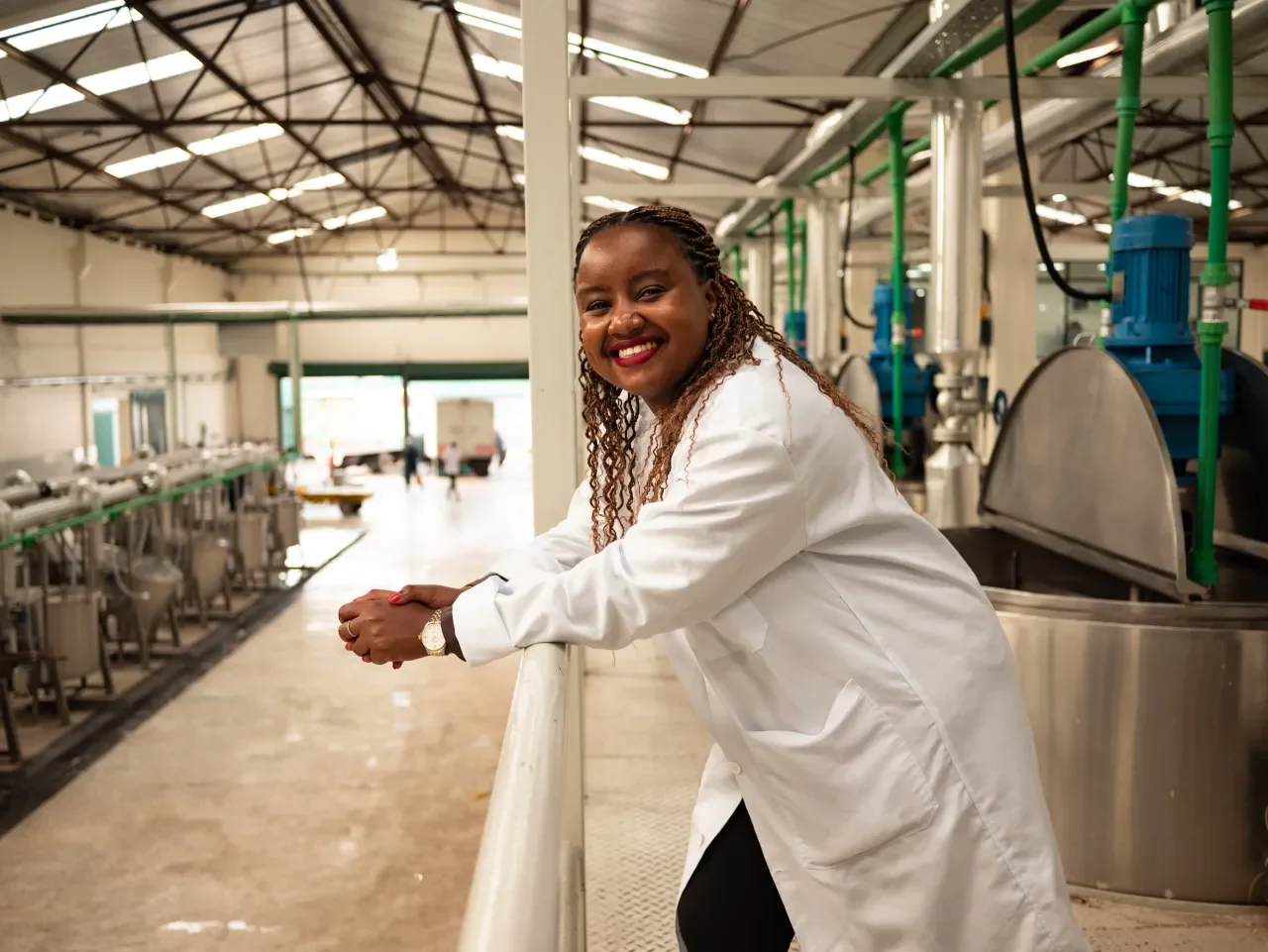Wawira Njiru’s TED Talk unveils Africa’s Blueprint to End Classroom Hunger
From Kenya to the world, Food4Education delivers a smarter, scalable solution.
Investing in school feeding programs transforms education, empowers communities, and fuels future generations. Explore insights, stories, and opinions that showcase this impact.

From Kenya to the world, Food4Education delivers a smarter, scalable solution.

This Day of the African Child, nearly 60 million African children risk going hungry in school as government funding falls short. Food4Education calls on governments to design policies that use tech, foster local economies, and put an end to classroom hunger for good.

On World Hunger Day, this instalment of Ingredients for Change champions the simple yet groundbreaking strategy for feeding school children daily, as part of durable public infrastructure. New Food spoke with Wairimu Nyandia to learn how a social enterprise in Kenya has transformed lives.

Innovative partnerships and sustainable solutions are reshaping school feeding in Africa, proving that resilience is built through collaboration. And Food4Education, which has grown into a scalable model supporting economic development, is leading the way.

For decades, the global development script has been predictable: African countries face a crisis, and aid flows from the West to respond. But today, the funding is drying up—and with it, the illusion that this model was ever sustainable.

Wawira Njiru is a Kenyan entrepreneur and visionary leader on African food systems, nutrition, philanthropy and social innovation. As Founder and CEO of Food4Education, an award-winning, locally rooted, and African-led solution to end classroom hunger, Wawira is the architect behind the blueprint to scale sustainable, nutritious, and affordable school feeding programs across Africa.

“A child who goes to school on an empty stomach is not just hungry for food, but also hungry for opportunity.” - His Majesty King Letsie III of Lesotho

As Kenya continues its journey toward universal education and sustainable development, one truth remains clear: a simple plate of food can mean the difference between a child thriving in the classroom or dropping out altogether. This plate is also more than just a meal - it has the power to transform not just the life of that child but also whole communities and local economies.

Since 2023, the school feeding program has provided 37,281,414 meals in Nairobi City County.

The Founder and CEO of Food4Education joins an elite group of women who are transforming business and philanthropy showcases biotech breakthroughs, AI advances, women’s health, and both consumer and social innovations, with a wide-ranging list of leaders, each of whom has accomplished a meaningful achievement in 2024, specifically.

According to the International Energy Agency (IEA), Kenya has made substantial progress in renewable energy and electricity access. In 2021, nearly 90 per cent of the energy generated and consumed in Kenya came from renewable sources, a notable increase from around 75 per cent in 2017.

Education and innovation are two of the few long-term policy levers available to governments to catalyze economic productivity and systemic change. But no matter the quality of education, children won’t learn if they aren’t well fed.

In this insightful discussion, AB engages with Wawira and Brian Tippens, Cisco's Senior Vice President and Chief Social Impact & Inclusion Officer, to explore the significance of community-driven initiatives, the implementation of sustainable practices in tackling the global food crisis, the crucial role of trust in fostering partnerships between corporations and communities, and much more.

Education is always about aspiration. It brings to life the hopes and dreams of children, parents, and communities. It’s about equipping each generation with the skills and knowledge they need to thrive in an ever-changing world.

Wawira Njiru has never had to look very far to see the devastating effects of chronic hunger. Growing up in Kenya, Njiru witnessed firsthand how malnourishment affected the lives of some of her classmates, particularly when it came to education.

Global Collaboration Towards Contribution to Educational Empowerment

School meal schemes are about more than just food: For kids facing hunger, cheap, nutritious meals can be transformative.

Globally we understand that the communities most vulnerable to climate change are the ones least responsible for it. The same is true of our children. If we calculated who is most affected yet least responsible for climate change, African children would likely emerge as those owed the most on this intergenerational global balance sheet.

The Head of State says F4E deserves praise for its success in establishing the essential infrastructure for school feeding programmes.

According to Africa Pulse Report 2024, the endless pangs of hunger have made 90 per cent of 10-year-olds in Sub-Saharan Africa unable to read simple text. A new World Bank report has found that seven in 10 children in Sub-Saharan Africa, including Kenya, are not benefiting from pre-primary education because they are hungry and malnourished.

Wawira Njiru, Founder and CEO of Food for Education, is on a mission to feed millions of school children across Africa. Currently, her organization provides 450,000 meals daily to over 1,200 schools across Kenya. Ahead of World Food Day on 16 October, the award-winning Ms. Njiru spoke with Kingsley Ighobor about her ambitions, the importance of nutritious meals for children, the impact of climate change on agricultural productivity, and more. Below are excerpts from the interview.

Food for Education currently feeds over 450,000 children a day in various counties in Kenya. Njiru said the number is barely 0.2 per cent of all the children facing malnutrition in Africa. Food for Education CEO Wawira Njiru called for urgent investment in the school feeding revolution.

Catalyst: “An agent that provokes or speeds significant change or action,” according to Merriam-Webster. What better way to describe the 16 inventors, entrepreneurs, visionaries, activists and investors who make up Bloomberg New Economy’s class of 2024 Catalysts? They’re trying to turn visions of a better world into reality. —Erik Schatzker

Food for Education (F4E) has opened a kitchen in Kakamega, providing meals for over 14,000 children in 28 public primary schools. Area Lead for Kisumu and Kakamega, Micheal Njiru, said Kakamega marks the 10th County that the organization has established its presence across the country.

Hungry kids have a hard time learning. Food4Education transforms children’s lives across Africa by providing cost-effective, locally sourced and nutritious school meals, allowing them to grow and thrive.

The Audacious Project supports big ideas to foster change around the world’s most urgent challenges. Today, this innovative funding initiative, housed at TED, is announcing its new cohort of projects for 2024, which are as bold as ever

Twelve years ago, we planted a tiny seed. That seed was feeding 25 kids a day in Ruiru Primary School, in the town I grew up in.

Food access and security is a significant problem throughout the African continent, and in Kenya alone, more than 5.4 million people are currently experiencing food insecurity classified at emergency or crisis levels.

In a world where childhood hunger remains a pressing issue, Summit Impact Fellow Wawira Njiru’s visionary leadership and unwavering commitment to social impact have positioned Food4Education as a beacon of hope.

What started out 12 years ago as an ad hoc way to feed 25 school children in a town outside of Nairobi is now Africa’s largest locally led and independently run school food program.

(Commentary) By implementing locally rooted school-feeding initiatives, we can effectively address this issue while triggering a transformative change in food systems